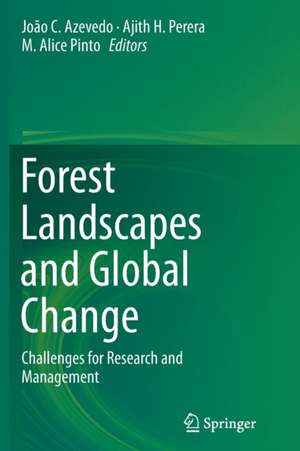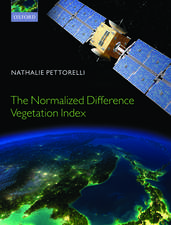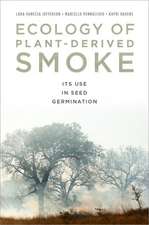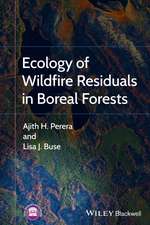Forest Landscapes and Global Change: Challenges for Research and Management
Editat de João C. Azevedo, Ajith H. Perera, M. Alice Pintoen Limba Engleză Paperback – 23 aug 2016
| Toate formatele și edițiile | Preț | Express |
|---|---|---|
| Paperback (1) | 639.59 lei 6-8 săpt. | |
| Springer – 23 aug 2016 | 639.59 lei 6-8 săpt. | |
| Hardback (1) | 645.79 lei 6-8 săpt. | |
| Springer – 14 iul 2014 | 645.79 lei 6-8 săpt. |
Preț: 639.59 lei
Preț vechi: 752.45 lei
-15% Nou
Puncte Express: 959
Preț estimativ în valută:
122.39€ • 128.04$ • 101.67£
122.39€ • 128.04$ • 101.67£
Carte tipărită la comandă
Livrare economică 02-16 aprilie
Preluare comenzi: 021 569.72.76
Specificații
ISBN-13: 9781493942800
ISBN-10: 1493942808
Pagini: 276
Ilustrații: XIII, 262 p. 43 illus., 13 illus. in color.
Dimensiuni: 155 x 235 x 14 mm
Greutate: 0.4 kg
Ediția:Softcover reprint of the original 1st ed. 2014
Editura: Springer
Colecția Springer
Locul publicării:New York, NY, United States
ISBN-10: 1493942808
Pagini: 276
Ilustrații: XIII, 262 p. 43 illus., 13 illus. in color.
Dimensiuni: 155 x 235 x 14 mm
Greutate: 0.4 kg
Ediția:Softcover reprint of the original 1st ed. 2014
Editura: Springer
Colecția Springer
Locul publicării:New York, NY, United States
Cuprins
Chapter 1. Forest Landscape Ecology and Global Change: an Introduction.- Chapter 2. Climate as an Agent of Change in Forest Landscapes.- Chapter 3. Wildfires and Landscape Dynamics in Portugal - A Regional Assessment and Global Implications.- Chapter 4. Humans as Agents of Change in Forest Landscapes.- Chapter 5. Changes in the Ecosystem Services Provided by Forests and their Economic Valuation - A Review.- Chapter 6. Carbon Fluxes and Storage in Forests and Landscapes.- Chapter 7. Forest Landscape Change and Biodiversity Conservation.- Chapter 8. Landscape Assessment and Monitoring.- Chapter 9. Forest Landscape Management in Response to Change: The Practicality.- Chapter 10. Forest Landscape Ecology and Global Change: What are the Next Steps.
Notă biografică
João C. Azevedo is a Professor at the Department of Environment and Natural Resources at the School of Agriculture of Polytechnic Institute of Bragança, Portugal, and Vice-coordinator and researcher at CIMO Mountain Research Centre. He is also the President of APEP (IALE Portugal) and the Regional representative of the IUFRO Landscape Ecology Working Party (IUFRO8.01.02) for the Mediterranean region. As a researcher his interests have been related mainly with forestry and landscape ecology, particularly the study of the effects of land change, through either abandonment or management, in biological and physical landscape processes. He is currently involved in national and international projects dealing with the interactions of landscape change and the provision of ecosystem services.
Ajith H. Perera is a senior research scientist and leads the Forest Landscape Ecology Program at the Ontario Forest Research Institute, Ontario Ministry of Natural Resources, Canada. He has over 25 years of research experience in landscape ecology, much of it focused on understanding patterns and processes of boreal forest fire regimes. He has produced over 100 scientific publications, including the books Ecology of a Managed Terrestrial Landscape: Patterns and Processes of Forest Landscapes in Ontario (2000), Emulating Natural Forest Landscape Disturbances: Concepts and Applications (2004), Forest Landscape Ecology: Transferring Knowledge to Practice (2006), Expert Knowledge and Its Application in Landscape Ecology (2010), Ecology of Wildfire Residuals in Boreal Forests (in press). Currently he is editing two volumes: Modeling Forest Landscape Disturbances and Mapping Forest Landscape Patterns.
Maria Alice Pinto is a Professor at the Department of Environment and Natural Resources, School of Agriculture, Polytechnic Institute of Bragança, Portugal, and a researcher at CIMO Mountain Research Centre. Her research has focused on theevolutionarily processes underlying patterns of genetic diversity using the honey bee as the model system. Currently she is using the tools of landscape genomics to unravel the complex patterns and processes of Iberian honey bee evolution. She is an author on over 20 peer-reviewed papers and 4 book chapters and the editor of 2 books. Maria Pinto earned a PhD degree in Entomology from Texas A&M University, USA, in 2003.
Ajith H. Perera is a senior research scientist and leads the Forest Landscape Ecology Program at the Ontario Forest Research Institute, Ontario Ministry of Natural Resources, Canada. He has over 25 years of research experience in landscape ecology, much of it focused on understanding patterns and processes of boreal forest fire regimes. He has produced over 100 scientific publications, including the books Ecology of a Managed Terrestrial Landscape: Patterns and Processes of Forest Landscapes in Ontario (2000), Emulating Natural Forest Landscape Disturbances: Concepts and Applications (2004), Forest Landscape Ecology: Transferring Knowledge to Practice (2006), Expert Knowledge and Its Application in Landscape Ecology (2010), Ecology of Wildfire Residuals in Boreal Forests (in press). Currently he is editing two volumes: Modeling Forest Landscape Disturbances and Mapping Forest Landscape Patterns.
Maria Alice Pinto is a Professor at the Department of Environment and Natural Resources, School of Agriculture, Polytechnic Institute of Bragança, Portugal, and a researcher at CIMO Mountain Research Centre. Her research has focused on theevolutionarily processes underlying patterns of genetic diversity using the honey bee as the model system. Currently she is using the tools of landscape genomics to unravel the complex patterns and processes of Iberian honey bee evolution. She is an author on over 20 peer-reviewed papers and 4 book chapters and the editor of 2 books. Maria Pinto earned a PhD degree in Entomology from Texas A&M University, USA, in 2003.
Textul de pe ultima copertă
Climate change, land use change, and many other drivers of landscape modification are occurring at increasing rates globally. They affect ecological patterns and processes in forest landscapes, and modify ecosystem services derived from those ecosystems. All of this presents many new challenges to scientists and managers. Although it is not uncommon to encounter the terms “global change” and “landscape” together in the ecological literature, there has been no adequate global analysis of drivers of change in forest landscapes and their ecological consequences. Providing such an analysis is the goal of this volume: an exploration of the state of knowledge of global changes in forested landscapes, with an emphasis on their causes and effects, and the challenges faced by researchers and land managers who must cope with these changes.
Caracteristici
A global analysis of drivers of change in forest landscapes and their ecological consequences Emphasizes the challenges faced by forest researchers and managers who must cope with rapid change Chapter authors provide a wide range of experience and perspectives to this volume Includes supplementary material: sn.pub/extras












